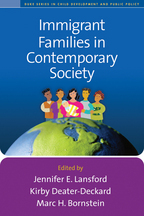Stereotypes and Stereotyping
Edited by C. Neil Macrae, Charles Stangor, and Miles Hewstone
Hardcover
Hardcover
orderMarch 1, 1996
ISBN 9781572300538
Price: $92.00 462 Pages
Size: 6" x 9"
“This much-needed volume is a thoroughly modern, thoroughly splendid collection of essays on the psychology of stereotyping written by the area's most influential thinkers and most active researchers. In its pages, readers will find just about everything that social psychology has discovered in a half century of research on this important topic.”

—Daniel Gilbert, PhD, Department of Psychology, University of Texas at Austin
“Sometimes edited books are promissory notes, indications that a lot of people really wish they knew something about a topic. At other times, an edited volume represents a mature body of knowledge in a field that is not only going somewhere but that has in fact just arrived. This book is of the latter variety, and a fine specimen. Stereotypes and Stereotyping collects and advances the best social psychological work in this rapidly developing area.”

—Daniel Wegner, Ph.D., Professor of Psychology, University of Virginia
“This is an excellent and timely collection of chapters by some of the most important researchers and theorists in the area. The past 20 years of work has revealed much about the cognitive aspects of stereotypes and stereotyping. Building on that foundation, social psychologists are now integrating affect, language, interpersonal interaction, and sociocultural variables to provide a more comprehensive account. Are stereotypes affective or cognitive? Are they in individuals' heads or in the cultural environment? Are they accurate or inaccurate? Do they cause or simply rationalize intergroup discrimination? In each case, research shows that the answer is probably both. Multi-level integrative theoretical approaches that can accommodate the interactivity and complexity of stereotypes are not yet fully developed, but the chapters in this book outline what is known and provide clear statements of the major unresolved issues.”

—Eliot R. Smith, Ph.D., Purdue University
—Daniel Gilbert, PhD, Department of Psychology, University of Texas at Austin
“Sometimes edited books are promissory notes, indications that a lot of people really wish they knew something about a topic. At other times, an edited volume represents a mature body of knowledge in a field that is not only going somewhere but that has in fact just arrived. This book is of the latter variety, and a fine specimen. Stereotypes and Stereotyping collects and advances the best social psychological work in this rapidly developing area.”
—Daniel Wegner, Ph.D., Professor of Psychology, University of Virginia
“This is an excellent and timely collection of chapters by some of the most important researchers and theorists in the area. The past 20 years of work has revealed much about the cognitive aspects of stereotypes and stereotyping. Building on that foundation, social psychologists are now integrating affect, language, interpersonal interaction, and sociocultural variables to provide a more comprehensive account. Are stereotypes affective or cognitive? Are they in individuals' heads or in the cultural environment? Are they accurate or inaccurate? Do they cause or simply rationalize intergroup discrimination? In each case, research shows that the answer is probably both. Multi-level integrative theoretical approaches that can accommodate the interactivity and complexity of stereotypes are not yet fully developed, but the chapters in this book outline what is known and provide clear statements of the major unresolved issues.”
—Eliot R. Smith, Ph.D., Purdue University







